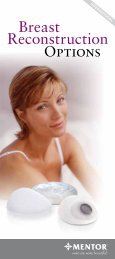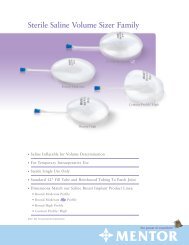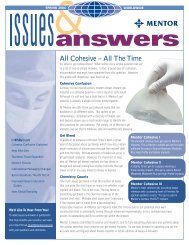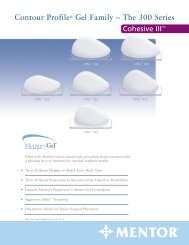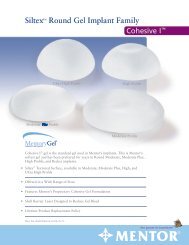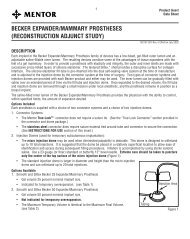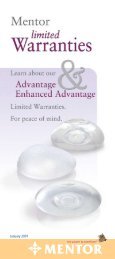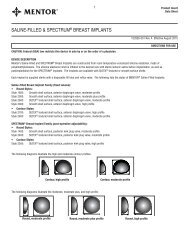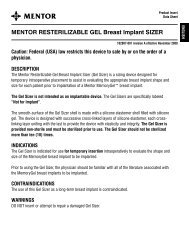Breast Reconstruction Patients Educational Brochure - Mentor
Breast Reconstruction Patients Educational Brochure - Mentor
Breast Reconstruction Patients Educational Brochure - Mentor
- No tags were found...
Create successful ePaper yourself
Turn your PDF publications into a flip-book with our unique Google optimized e-Paper software.
33• Effects on Children Born to Mothers with <strong>Breast</strong> ImplantsIt is not known if a small amount of silicone may move through the breast implant shelland pass into breast milk. There is no test for detecting silicone in breast milk that isconsidered accurate. There has been a study that measured silicon levels (one componentof silicone). It did not indicate higher levels of silicon in breast milk from women withsilicone gel breast implants when compared to women without implants. 57In addition, questions have been raised about whether silicone gel breast implants couldharm babies whose mothers had implants while pregnant. Two studies in humans havefound that the risk of birth defects overall is not increased in children born after breastimplant surgery. 58,59 Although low birth weight was reported in a third study, other factors(for example, lower pre-pregnancy weight) may explain this finding. 60Overall, there is no evidence that shows that silicone gel breast implants have any harmfuleffects on the children of implanted women. 9,10,58,59,60• SuicideSome studies have reported a higher incidence of suicide in women with breast implants,but it is not clear whether these suicides were associated with having silicone gel breastimplants or some other underlying condition that can lead to suicide, depression and/oranxiety. 29,61,62,63,64,65,66,67 One researcher 68 believes that some women who want cosmeticsurgery suffer from a disorder, called body dysmorphic disorder (BDD), which may causethem to think about suicide or attempt suicide.The strongest predictor for suicide is having been hospitalized for any psychiatric condition.One study found that women with breast implants were admitted to the hospital more oftenbecause of psychiatric problems before they even had their implant surgery, compared towomen who had breast reduction or to the general population. 61 This may be a contributingfactor to the reported higher incidence of suicide in women with breast implants.• Neurological Disease, Signs, and SymptomsSome women with breast implants have complained of neurological symptoms suchas difficulties with vision, sensation, muscle strength, walking, balance, thinking, orremembering things. Some have been diagnosed with diseases such as multiple sclerosis(which is an autoimmune disease that affects the nerves). Some of these women believetheir symptoms are related to their implants. A scientific expert panel found that there isnot enough reliable evidence that neurological problems may be caused by or associatedwith breast implants. 9 Other researchers have found more evidence that silicone gel breastimplants do NOT cause neurological diseases or symptoms. 9,22,69 There is one publishedreport of an increased risk of multiple sclerosis among women with silicone gel breastimplants; 44 these researchers did not find any increased risk of other neurological symptoms.• Potential Health Consequences of Gel BleedSmall quantities of low molecular weight (LMW) silicone compounds, as well as platinum(in zero oxidation state), have been found to diffuse (bleed) through an intact implant shell. 9,70The evidence is mixed as to whether there are any clinical consequences associated withgel bleed. For instance, studies on implants implanted for a long duration have suggestedthat such bleed may be a contributing factor in the development of capsular contracture 9 andlymphadenopathy. 7 However, evidence against gel bleed being a significant contributing factorto capsular contracture and other local complications is provided by the fact that there aresimilar or lower complication rates for silicone gel-filled breast implants than for saline-filledbreast implants. Saline-filled breast implants do not contain silicone gel and, therefore, gelbleed is not an issue for those products. Furthermore, toxicology testing has indicated thatthe silicone material used in <strong>Mentor</strong>’s implants does not cause toxic reactions when largeamounts are administered to test animals. It should also be noted that studies reported inthe literature have demonstrated that the low concentration of platinum contained in breastimplants is in the zero oxidation (most biocompatible) state. 71,72,73,74<strong>Mentor</strong> performed a laboratory test to analyze the silicones and platinum (used in themanufacturing process), which may bleed out of intact implants into the body.



